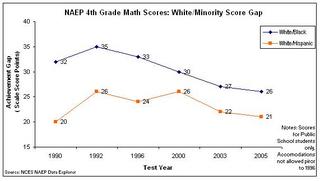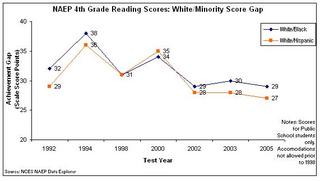NAEP 4th Grade Data Trends, by Race
(NB: the Y-axis scale is different on each of these graphs, in order to maximize their readability)



 So... looking at the NAEP score trends by race, the statement that achievement gaps are closing "particularly in the 4th grade" doesn't seem true.
So... looking at the NAEP score trends by race, the statement that achievement gaps are closing "particularly in the 4th grade" doesn't seem true.The only gap change that might be statistically significant from 1990-2005 is the White/Black Math gap, at 6 points down. In Reading, the gaps are down 2 to 3 points from the first NAEP, after an INCREASE in the gap in the mid-90s. My guess is that 2 or 3 points isn't statistically different. And even if it were statistically, it's not substantively.
Also, there's a lot of footnoting in the NAEP data about how testing accomodations weren't allowed in the early test administrations. I take this to mean that there were some non-English speakers and students with disabilities tested without regard to their limitations in NAEP's early years, which should have lead to actual achievement being underreported. Knowing what we do about Special Ed and LEP populations, this should have disproportionally dragged down Black student scores on the SpEd end and Hispanic student scores in terms of LEP. We can't know how much, but it does make me question whether the "improvements" you see in the scores over time are due to an incresease in their collective knowledge or a change in the rules of the game.
My theory that the people writing the sound bites were looking at overall trends doesn't pan out--I wonder where those statements come from?
7 Comments:
-
here's my theory: no one actually looked at the data.
By KF, at October 19, 2005 9:42 PM -
Thank you! I'm glad I'm not the only one who sees this.
By Elliot H., at October 19, 2005 9:42 PM -
Being a contractor who works on NAEP, I can assure you that the data is thoroughly analyzed for key findings - gap closing, while not substantive, were significant between white, black, and hispanic students in the 4th grade for reading.
By , at November 07, 2005 5:10 PM
Also, note that while accommodations were not permitted prior to '96, that doesn't necessarily mean that those students were assessed - in fact, many states chose to exclude those students from participating so that it would not pull their scores down as was suggested. -
MGS-- thanks for the info!
By NMD, at November 08, 2005 5:19 PM
The statistically significant/substantive distinction is important, because in all of the soundbites, the implication (I think) is that there has been a *substantive* decrease in the achievement gap. From the press releases, you'd think that kids are making real, meaningful progress. Seems misleading to me... -
The messages can be misleading, but one does have to look at the gains that the minority groups have been showing... When you consider the demographic shifts our country has seen and how the education system has had to address the needs of increasing minority populations, we should be pleased to see their increasing scores, even if only significant instead of substantive.
By , at November 10, 2005 11:47 AM
We should also be pleased that the score gaps are closing in a positive way. For the most part, ALL groups are increasing to some extent, but minority children are increasing at a faster rate, thus closing the gap. I would rather see this than a negative closing where the scores of the top children are decreasing and the gap closes no matter if other groups are staying stagnant or increasing. -
I'm not trying to be an Eeyore about the whole thing... I agree that statistically significant (if not substantive) progress is better than changes in the other direction. BUT I think we should keep in mind these changes aren't that different from no change at all.
By NMD, at November 10, 2005 4:12 PM
People who only hear press buzz probably think we've made some really exciting breakthroughs, when even a very optimistic interpretation of the data (in the aggregate) just doesn't warrant it. -
And it's up to us to share what we know about the issues below the surface to educate those audiences...
By , at November 11, 2005 4:18 PM
<< Home
from: :: permalink




